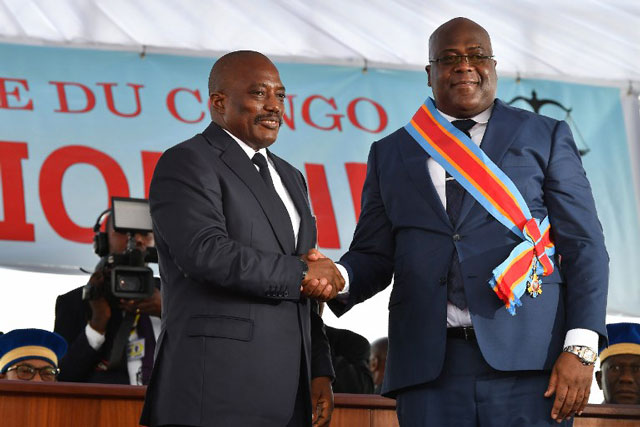
Lubumbashi, DR Congo | AFP | DR Congo President Felix Tshisekedi on Monday named a government veteran, Sylvestre Ilunga Ilunkamba, as the next prime minister, a move that came nearly four months after his inauguration.
Ilunga Ilunkamba was appointed under “the political agreement” between Tshisekedi and his predecessor Joseph Kabila “regarding the creation of a coalition government,” presidential spokesman Kasongo Mwema Yamba Yamba said.
Illunga Ilunkamba, whose government career spans decades, replaces Bruno Tshibala, who had been appointed by Kabila in 2017. Ilunga Ilunkamba’s aides gave his age as 78.
Tshisekedi was sworn in on January 24 after elections that marked the Democratic Republic of Congo’s first peaceful transition of power since the vast country gained independence from Belgium in 1960.
But the vote was marred by allegations of rigging, and Tshisekedi is struggling to push through with pledges of reform.
The country’s politics remain overshadowed by Kabila, who amassed extensive clout after 18 years in power.
His political allies retain the upper hand in parliament, provincial assemblies and governorships across the unstable country. His men also play a major role in security services.
Ilunga Ilunkamba, speaking to the press after meeting Tshisikedi, said, ” I would like to thank his excellency, Joseph Kabila Kabange, who proposed me as prime minister and assured me of his trust.”
He vowed to throw himself into ensuring the “harmonious governance of the coalition.”
Tshisekedi told him the priorities would be “social, meaning education, health, security and establishing peace,” he said.
A PhD in economics from the University of Kinshasa, Ilunga Ilunkamba began his political career under former dictator Mobutu Sese Seko, who was overthrown in 1997.
His long record in government includes four spells as vice minister and two as minister for planning and finance. Prior to his new appointment, he was director general of the DRC’s railway corporation, the SNCC.
#RDC Le Dr Sylvestre ILUNGA ILUNKAMBA, est nommé Premier Ministre par ord. n 19/056. Cet ancien Directeur Général de la Société Nationale des Chemins de fer du Congo (SNCC SA) va être à la tête du nouveau Gouvernement dont la structure est en cours d’élaboration. pic.twitter.com/rPZgAkWrVa
— Présidence RDC 🇨🇩 (@Presidence_RDC) May 20, 2019
– Katumbi returns –
Meanwhile, thousands of people welcomed Moise Katumbi, a prominent foe of Kabila, as he landed at Lubumbashi airport on Monday after three years in self-imposed exile.
Katumbi, 54, a wealthy businessman of mixed Greek and Congolese origin, served as the elected governor of Katanga in southeastern DR Congo before the province was divided up in a territorial revision.
He was once an ally of Kabila but the pair fell out. Katumbi was given a three-year jail term in absentia for alleged property fraud — an accusation he denied — and was barred from standing in last December’s elections.
The conviction was annulled before Katumbi flew back to his homeland three years to the day after he left for Belgium.
“The truth always triumphs in the end,” Katumbi, the owner and president of the renowned TP (“All Powerful”) Mazemba football club, told his fans at the airport.
“I return for peace and for national reconstruction in our country,” he said.
Katumbi returned in a private jet to find supporters, many dressed in white, lining the road between the airport and the centre of Lubumbashi, now the capital of mineral-rich Haut-Katanga province.
He has also been an opponent of Tshisekedi and has yet to make clear what role he plans to play.
In the December 30 election, Katumbi backed Martin Fayulu, another wealthy businessman, who claims he was denied victory thanks to a back-room deal between Kabila and Tshisekedi.
Monday’s developments coincided with a visit by French Foreign Minister Jean-Yves Le Drian, the highest-ranking European official to come to Kinshasa since the election.
The French minister pledged “a programme of 300 million euros ($335 million) for the duration of Mr Tshisekedi’s mandate” in sectors including development, training, health, security, agriculture and energy.
 The Independent Uganda: You get the Truth we Pay the Price
The Independent Uganda: You get the Truth we Pay the Price





